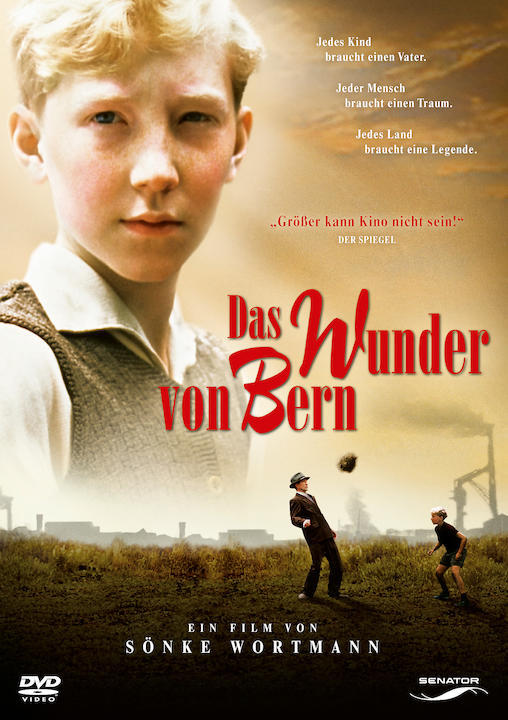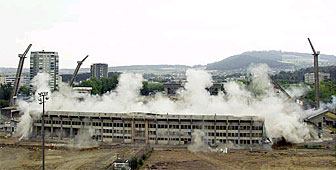Bern looks to score from football film

A film about West Germany’s surprise victory over Hungary in the 1954 World Cup final has been a hit at the German box office.
It is now hoped “Das Wunder von Bern” (the Miracle of Bern) could also do wonders for the stagnating tourism economy in and around the Swiss capital.
The film is a touching drama of reconciliation between a father, who has just returned from a prisoner-of-war camp in Russia, and his 11-year-old football-mad son.
And it is the 1954 World Cup that brings them – and the rest of Germany – together again.
To this day, many Germans say the victory lifted the spirit of a country shattered by war and helped put it on the road to recovery.
The popularity of the film, combined with the 50th anniversary celebrations planned for next year, is expected to rekindle German interest in Switzerland as a holiday destination.
Declining numbers
The film comes at an opportune moment since the number of German visitors has been declining due to the recession in Germany and the high cost of a Swiss holiday.
The Swiss tourist industry can ill afford to let the slide continue.
Germans account for 16 per cent of all visitors to the city of Bern where the 1954 World Cup final was played.
This figure climbs to a massive 30 per cent in the Lake Thun region where the legendary German team stayed and practised.
Raymond Gertschen, Bern’s director of tourism, told swissinfo that the Wankdorf stadium, where the final was held, had long been a “place of pilgrimage” for Germans.
“I think the 50th anniversary, combined with the film, will generate some business for us,” he says.
Miracle package
His office has even put together a special “Miracle of Bern” package.
The original Wankdorf was demolished two years ago, but a new football stadium is being constructed and visitors will be shown around the site.
They will also be invited to take part in a penalty-shooting competition, treated to a private screening of the film and taken to the Hotel Belvédère in the town of Spiez where the team stayed.
Unlike the stadium, the hotel still exists and is likely to reap a huge dividend from the film and anniversary.
Its director; Markus Schneider, is confident the hotel’s 33 rooms will be fully booked next year with German fans eager for a trip down memory lane.
World Cup shrine
He is planning to turn one of the hotel seminar rooms into a ’54 World Cup shrine, complete with a miniature replica of the Wankdorf and displays of the players’ belongings.
Besides the exhibition, the hotel will sell limited edition wristwatches partially filled with small bits of rubble from the old stadium, limited edition footballs and copies of a signed team photograph.
However, Schneider believes the highlight of any visit to the hotel will be a look round the room where the German captain, Fritz Walter, and winning goal scorer, Helmut Rahn, stayed.
Standing on the room’s balcony overlooking the bay of Spiez, its medieval castle and vineyards, Schneider recalls a remark made by the German captain.
Spirit of Spiez
“Walter said the ‘Miracle of Bern’ would not have been possible without the ‘Spirit of Spiez’,” he says, before going on to relate how the German team came to stay in Spiez.
“No hotel wanted to put up the German team,” adds Schneider. “It was only thanks to the good relations the German assistant coach had with the director of the hotel that he was able to convince him to take the team.
“About 80 per cent of the Belvédère guests at the time were Dutch, and the Dutch of course were not keen on sharing the hotel with Germans, so soon after the war.”
Artistic licence
The “Spirit of Spiez” was lost on the film’s director, Sönke Wortmann, who chose to shoot all the hotel scenes at a location on the other side of Lake Thun.
While many in Spiez found this decision hard to take, it could prove to be a blessing for the regional tourism authorities.
“In all of our promotional material for next year, we have advertised the fact that the film was shot around Lake Thun,” says Beat Anneler, head of Lake Thun tourism.
Anneler expects to see the number of German tourists increase by two to three per cent next year.
And more importantly, the film should awaken an interest in Switzerland among a new generation of Germans, he says.
swissinfo, Dale Bechtel in Spiez
More than two million people in Germany saw the film in the first three weeks after its release.
Many of the Swiss scenes were shot on location around Lake Thun.
The film tells the story of a returning German prisoner-of-war in 1954 set against the backdrop of the 1954 World Cup, played in Switzerland.
The German team were underdogs, considered fortunate to have reached the final against the strongly fancied Hungarians.
However, the Germans, led by captain Fritz Walter and forward Helmut Rahn, overcame a 2-0 deficit to win the match 3-2. Rahn scored the winning goal in the dying minutes.

In compliance with the JTI standards
More: SWI swissinfo.ch certified by the Journalism Trust Initiative









You can find an overview of ongoing debates with our journalists here . Please join us!
If you want to start a conversation about a topic raised in this article or want to report factual errors, email us at english@swissinfo.ch.